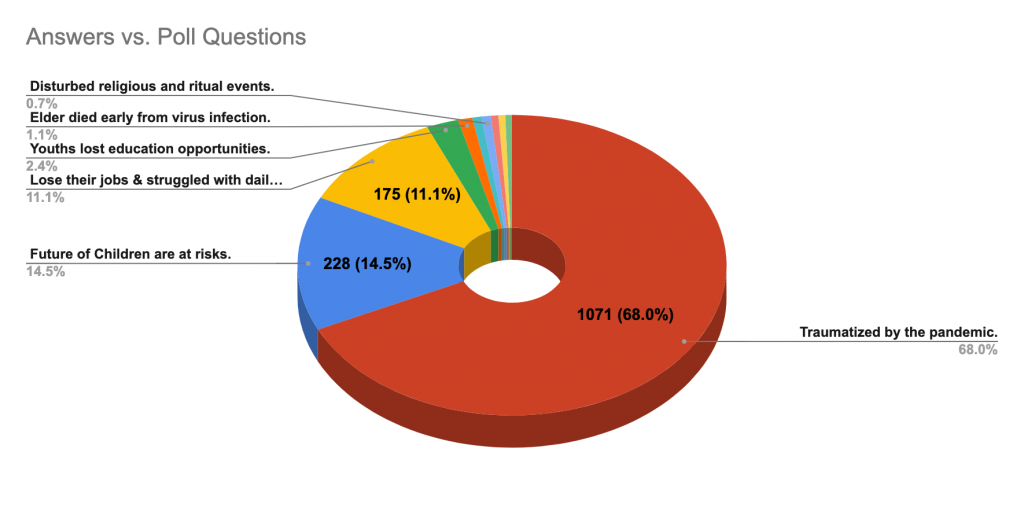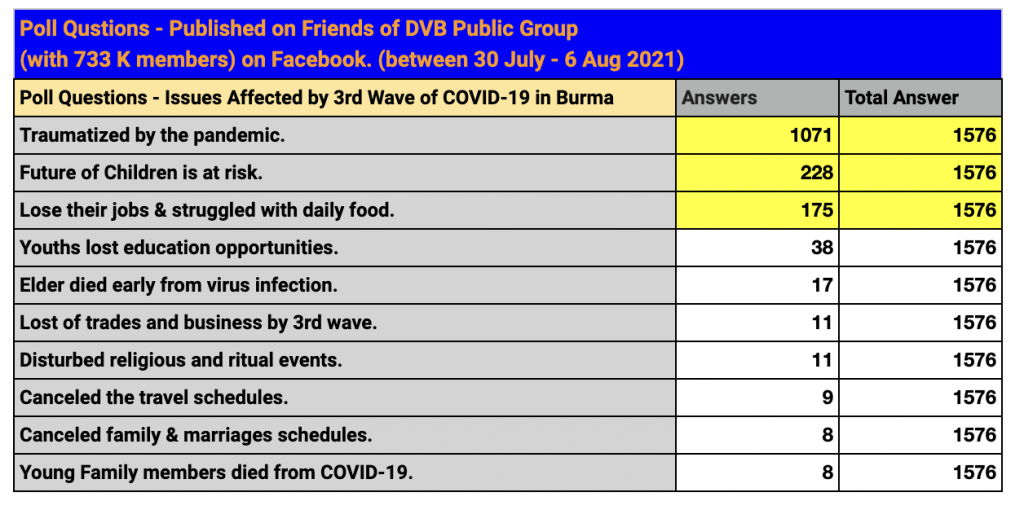Emotional trauma appears to be the defining effect of the third-wave of Covid-19 upon the people of Burma, a survey performed by DVB has shown.
A recent poll on a Facebook group with 733,000 followers, completed by over 1,500 users, reveals that 68 percent of respondents felt that the trauma stemming from social dislocation wrought by the pandemic had been the most personally damaging outcome of the Delta variant outbreak.
The deleterious effect of mental harm was observed far more frequently than the perhaps more striking “loss of one’s children’s future” (14.5 percent), and “losing one’s job and struggling for daily survival” (11.1 percent), responses which, although ranking second and third, are still shocking in their prevalence.
The poll’s findings reflect the personally ruinous nature of this new, more deadly strain of Covid-19 within Burma, emerging as the country faces many other existential threats to the fabric of its society following February’s coup.
As a result of both the coup government’s deliberate targeting of healthcare professionals and it’s violent monopolisation of Burma’s medical resources, Burma’s healthcare system has crumbled, forcing an entire nation to fend for itself against the virus, and prompting infection rates that are perhaps globally unparalleled in its wake.
For many, the immediacy of death, and the suffering that this engenders, has become an everyday reality, with conversation and social media feeds now almost exclusively dedicated to obituaries that, in most other scenarios, would almost all have been preventable. Tragedies that many within Burma are struggling to justify emotionally.
“Almost everyone in Burma is now facing the deepest of grief reactions, bereavement, over the death of loved ones, close family, relatives, or colleagues during the third wave of the pandemic,” one practicing Burmese mental health expert, who asked to remain anonymous, told DVB.
“If prolonged for years, such trauma will lead to a deterioration in overall health, in social conditions, and in productivity at work. Given timely treatment, however, those suffering trauma as a result of bereavement may recover within months. Extreme trauma is preventable,” said the doctor.
Mental health treatment is an area that has long been terminally underdeveloped within Burma. The collapse of Burma’s healthcare system is unlikely to reduce access to those needing psychological care as provision has always been scarce, even for Burma’s wealthy urban elite.
Despite this, the post-coup stagnation of Burma’s socio-economy—plus the perpetual horror broadcast across social media platforms since the Burmese army were released from barracks—has alerted many to the very real impact of mass trauma on both mental well-being and social interaction, as DVB’s survey suggests.
“After the Second World War, the world experienced mass trauma, because the Second World War affected many, many lives. And now, even with this Covid pandemic, with bigger magnitude, more lives have been affected,” WHO Director-General Tedros Adhanom Ghebreyesus said at a news conference in early March 2021. An apt comparison for Burma, a now traumatised nation besieged by both domestic terror and rampant pandemic.





